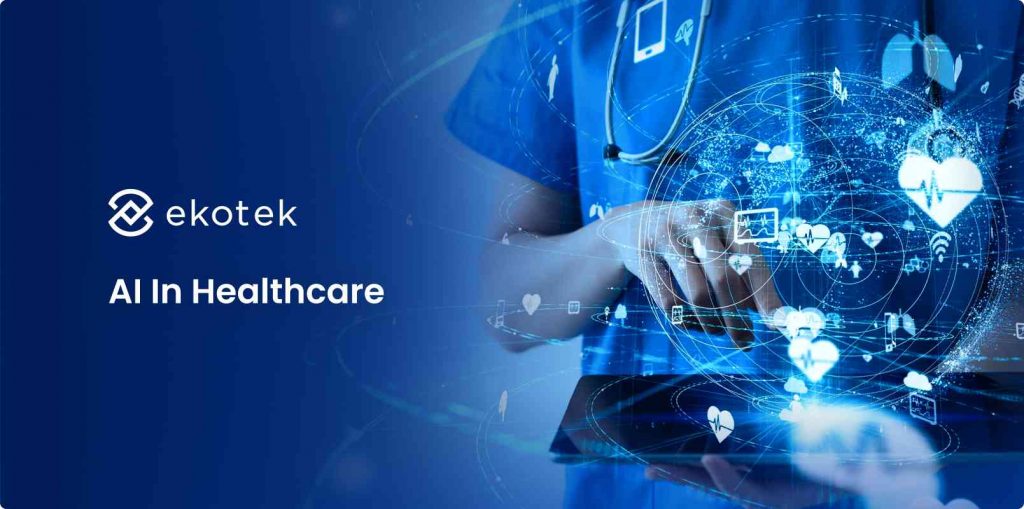Introduction
AI in healthcare is no longer a future concept, it’s a present-day force reshaping the industry’s operational and strategic landscape. As organizations confront rising costs, workforce shortages, and an urgent demand for innovation, AI offers a path to streamline decision-making, enhance patient outcomes, and drive greater efficiency across the board.
Beyond automation, AI is accelerating the shift toward data-driven care models, predictive operations, and smarter resource allocation. This article explores how AI is redefining healthcare workflows, optimizing organizational performance, and creating measurable value in a rapidly evolving ecosystem
The Current State of Healthcare Technology
Evolving Needs and Challenges
Healthcare systems face rising demands, from aging populations and chronic diseases to a shortage of medical professionals. Traditional infrastructures, often fragmented and data-siloed, struggle to meet these complexities efficiently. Digitization has made strides, but major hurdles remain in areas like interoperability, real-time analytics, and resource optimization.
Technology Adoption Trends
Recent years have seen accelerated investments in healthcare IT, electronic health records, and health data analytics. Yet, the integration of advanced technologies such as AI, blockchain, and the Internet of Medical Things (IoMT) distinguishes leading organizations from the rest. The COVID-19 pandemic further highlighted the value of digital tools for remote monitoring, telehealth, and rapid data sharing.
The Role of AI in the Technological Ecosystem
Artificial intelligence acts as the connective tissue in the healthcare tech ecosystem, automating repetitive tasks, enhancing diagnostics, and enabling precision medicine. Hospitals now deploy AI-powered triage systems, pharmaceutical firms use machine learning for drug discovery, and digital health startups offer remote patient monitoring applications that personalize care.
Why AI Matters for Healthcare Businesses
 AI has become a strategic driver of transformation across the healthcare industry, enabling organizations to operate smarter, faster, and more competitively. Below are six business-critical reasons AI is reshaping the future of healthcare.
AI has become a strategic driver of transformation across the healthcare industry, enabling organizations to operate smarter, faster, and more competitively. Below are six business-critical reasons AI is reshaping the future of healthcare.
Enhanced Operational Efficiency
AI streamlines complex workflows that traditionally drain time and resources.
-
Automates routine administrative tasks like scheduling and claims processing
-
Reduces human error and shortens turnaround times for key processes
-
Frees staff to focus on higher-value activities that drive strategic impact
Stronger Data-Driven Decision-Making
Healthcare organizations generate massive amounts of data, AI turns this data into actionable intelligence.
-
Identifies patterns and insights that humans may overlook
-
Supports more accurate forecasting for demand, staffing, and budgeting
-
Enables leaders to make strategic decisions backed by real-time analytics
Improved Patient Outcomes and Personalization
AI empowers a shift from reactive care to predictive, personalized care models.
-
Uses predictive analytics to flag risks earlier and guide interventions
-
Recommends tailored treatment pathways based on patient history and behavior
-
Enhances continuity of care through more precise and timely insights
⭐️ Dive into the comparison of Generative AI vs Predictive AI
Cost Reduction and Resource Optimization
AI helps healthcare businesses control rising operational and clinical costs.
-
Optimizes resource allocation, from equipment usage to staffing levels
-
Reduces unnecessary procedures through smarter diagnostics
-
Cuts operational waste by improving accuracy and workflow coordination
Enhanced Compliance and Risk Management
With increasing regulatory complexity, AI helps organizations stay compliant and minimize risk.
-
Monitors data for anomalies or compliance violations
-
Improves documentation accuracy for audits and reporting
-
Strengthens security through advanced threat detection algorithms
Accelerated Innovation and Competitive Advantage
AI allows healthcare businesses to move faster and differentiate in a crowded market.
-
Enables rapid experimentation with new care models and digital solutions
-
Supports innovation in areas like virtual care, remote monitoring, and drug discovery
-
Positions organizations as forward-thinking, tech-enabled leaders
⭐️ Download our e-book to learn more about Generative AI use cases for enterprises
Real-World Use Cases and Success Stories
AI-Powered Diagnostics and Clinical Decision Support
AI is elevating diagnostic accuracy and helping clinicians make faster, more informed decisions.
-
Imaging algorithms can detect abnormalities, such as tumors or fractures, earlier and with high precision
-
Clinical decision support systems analyze patient data to recommend evidence-based treatment options
-
Hospitals report reduced diagnostic delays and improved patient outcomes through AI-assisted workflows
A successful story:
- Moorfields Eye Hospital collaborated with DeepMind to develop an AI system that analyzes OCT scans and detects over 50 eye diseases. The tool achieved accuracy comparable to top specialists and significantly reduced diagnostic time. This has helped clinicians deliver earlier interventions and improve patient outcomes
Predictive Analytics for Operational Forecasting
Healthcare organizations are using AI to anticipate demand and allocate resources more intelligently.
-
Predicts patient admission volumes to optimize staffing and bed usage
-
Forecasts supply needs, reducing stockouts and minimizing surplus inventory
-
Improves business planning through more accurate financial and operational forecasts
A successful story: Ekotek built a Medical Imaging AI Platform capable of collecting, labeling, training, and testing medical images sourced from multiple hospitals and medical institutions. The platform uses advanced computer vision models to automatically analyze imaging data and detect conditions such as brain aneurysms, spinal fractures, and dental cysts. By streamlining the entire medical-image workflow, this app significantly reduces diagnostic workload and improves accuracy for clinicians.
Automation in Administrative and Revenue Cycle Management
AI-driven automation is transforming back-office operations, lowering costs and reducing errors.
-
Intelligent bots streamline claims processing and eligibility checks
-
Automated coding systems improve accuracy and accelerate billing cycles
-
Organizations experience fewer claim denials and faster reimbursement timelines
A successful story: Inova Health System introduced an autonomous medical coding engine in its emergency department. The solution reduced DNFB time by 50% and boosted charge capture by 10%. As a result, the organization achieved faster reimbursements and improved cash flow stability
Personalized Care and Patient Engagement
AI enhances patient experiences by delivering tailored care at scale.
-
Recommendation engines personalize treatment plans based on individual behaviors and medical history
-
Virtual health assistants provide real-time support, appointment reminders, and medication guidance
-
Providers see higher patient engagement and better adherence to care plans
A successful story:
- University of Rochester Medical Center adopted Butterfly iQ portable ultrasound devices powered by AI. Clinicians were able to capture clearer images at the point of care, speeding up diagnostic decisions. This also improved care consistency across different departments
- Ekotek developed a skin-evaluation mobile app that uses AI to analyze both live camera input and uploaded photos, delivering accurate assessments of facial features and skin conditions. The app generates a visualized report with scores and personalized skincare recommendations, creating an engaging and intuitive user experience. This AI-driven capability not only elevated the client’s digital offering but also opened new commercial opportunities through product recommendation integrations.
⭐️ Check out how we built an AI-powered beauty app
AI-Enabled Population Health Management
Health systems leverage AI to understand population patterns and proactively address risks.
-
Identifies high-risk groups and predicts chronic disease progression
-
Helps design targeted interventions that improve outcomes for large patient cohorts
-
Drives more effective long-term planning and resource allocation across communities
A successful story: The UK’s National Pathology Imaging Cooperative (NPIC) uses AI to analyze digital pathology slides for early cancer detection. The system supports large-scale screening with improved accuracy and faster review times. This allows health systems to design more proactive population health strategies
Breakthroughs in Drug Discovery and Clinical Research
AI accelerates the entire research lifecycle, reducing time and cost.
-
Models simulate drug interactions and identify promising molecules within minutes
-
Algorithms optimize clinical trial design, patient matching, and monitoring
-
Pharmaceutical companies shorten development timelines and reduce R&D spending
A successful story: Owkin partnered with several global pharma companies through the MELLODDY project, applying federated learning to massive research datasets. The AI models identified promising drug candidates more efficiently while protecting sensitive data. This approach helped shorten early-stage discovery cycles and cut experimentation costs
Strategic Roadmap: How Businesses Can Adopt AI in Healthcare
 Define Clear Business Objectives
Define Clear Business Objectives
Before selecting tools or vendors, organizations should identify the specific challenges AI needs to solve. Whether the goal is to reduce operational costs, improve diagnostic accuracy, or enhance patient experience, clarity ensures the initiative delivers measurable value. A well-defined objective also helps align leadership and secure cross-functional support.
Assess Data Readiness and Infrastructure
AI thrives on clean, accessible, and well-structured data. Businesses should evaluate the quality of their clinical, operational, and financial datasets while ensuring secure, compliant data governance practices. Investing early in interoperability and centralized data platforms dramatically improves AI performance in later stages.
Start with High-Impact, Low-Complexity Use Cases
Instead of attempting enterprise-wide transformation immediately, organizations should begin with one or two targeted use cases. Examples include claims automation, imaging triage, or predictive analytics for staffing. These quick wins help build internal momentum and create a model for scaling.
Choose the Right Partners and Technology Stack
Healthcare AI solutions vary widely in capability, integration complexity, and regulatory compliance. Businesses should evaluate vendors based on proven real-world deployments, interoperability with existing systems and ongoing support. Strategic partnerships also accelerate innovation and reduce internal workload.
⭐️ Read more about AI Outsourcing
Build a Cross-Functional AI Governance Team
Successful AI adoption requires collaboration between clinical leaders, IT, data scientists, compliance officers, and business executives. A governance team ensures ethical use, monitors performance, and manages risk throughout the lifecycle. This structure also supports transparent decision-making and regulatory alignment.
⭐️ How project managers are using generative AI for efficiency
Pilot, Validate, and Iterate
Pilot projects allow teams to test real-world performance, identify workflow challenges, and gather user feedback. Measurable KPIs, such as reduced wait times, improved accuracy, or lower administrative costs, validate the AI’s impact. Iteration ensures the solution remains effective as operations evolve.
Scale and Integrate Across the Organization
Once validated, AI solutions can be scaled to additional departments, facilities, or business lines. Standardized onboarding, training, and change-management processes help ensure smooth adoption. Continuous monitoring and updates ensure the AI remains aligned with business goals and regulatory requirements.
Foster a Culture of Innovation and Continuous Learning
AI is not a one-time technology investment, it’s a long-term capability. By fostering a culture that embraces experimentation, supports upskilling, and rewards innovation, healthcare businesses can stay ahead of industry shifts. This mindset ensures the organization continues to evolve as AI technologies advance.
The Next Decade of AI in Healthcare
Technological Advancements
- Emerging areas include federated learning, edge computing, and explainable AI, promising even more robust and equitable solutions.
- Fusion of AI with blockchain will enhance data integrity and secure real-time interoperability.
Patient-Centric Models
- AI will fuel personalized medicine at scale, tailoring prevention, diagnosis, and therapy for every patient.
- Smart hospitals and ambient intelligence will redefine patient and clinician experiences.
Business and Investment Trends
- Growth in digital health funding is driving collaboration among tech companies, healthcare providers, and payers.
- Global adoption will expand as costs decrease and cloud-based solutions become widespread.
Conclusion
AI in healthcare is no longer an emerging trend, it is the foundation of modern patient care and medical practice transformation. From improving diagnostics and empowering patients to streamlining operations and advancing scientific discovery, AI’s impact is profound and expanding.
Ekotek helps healthcare enterprises turn AI ambitions into real-world results. As a world-class AI development provider, our team brings deep technical expertise, strong engineering talent, and globally trusted certifications, including Google TensorFlow Certification and AWS/Azure Machine Learning Certifications. Our capabilities span the full spectrum of AI, computer vision, natural language processing, speech AI, data analytics, recommendation systems, and generative AI with large language models. We deliver rapidly, maintain exceptional quality, and provide ongoing support to ensure solutions continue to perform as your business grows. With Ekotek, your organization gains a long-term partner committed to delivering scalable, future-ready AI innovation
FAQ on AI in healthcare
1. How can AI provide measurable ROI for healthcare organizations?
AI delivers ROI by reducing operational costs, improving clinical accuracy, accelerating workflows, and enabling smarter resource allocation. Most organizations see early returns from automation, predictive analytics, and enhanced patient throughput.
2. What types of healthcare operations benefit most from AI?
High-impact areas include diagnostics, scheduling, claims processing, patient triage, supply chain forecasting, and population health analytics. These functions generate large amounts of data and manual workload, ideal conditions for AI-driven optimization.
3. Is AI in healthcare difficult to integrate with existing systems like EHRs?
Integration complexity varies, but modern AI solutions are built with interoperability and API compatibility in mind. With the right implementation partner, organizations can integrate AI into existing EHRs and workflows without major disruptions.
4. What governance or compliance considerations should leaders keep in mind?
Executives should establish clear guidelines for data privacy, model transparency, bias monitoring, and regulatory compliance. A cross-functional governance team ensures AI is deployed responsibly and aligns with clinical, operational, and ethical standards.

 Define Clear Business Objectives
Define Clear Business Objectives
